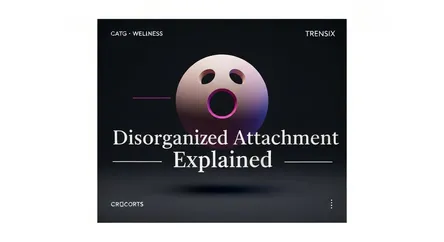Wellness
Disorganized Attachment Explained

Understand disorganized attachment, an insecure attachment style causing unpredictable behavior in relationships, often stemming from childhood trauma.
What is it?
Disorganized attachment, also known as fearful-avoidant attachment, is one of the four main attachment styles identified in psychology. It is characterized by inconsistent and contradictory behaviors in relationships. Individuals with this style often desire emotional intimacy but are simultaneously terrified of it. This internal conflict typically develops in childhood when a primary caregiver—who should be a source of safety—is also a source of fear due to abuse, neglect, or other traumatic experiences. As a result, the child learns that the person they depend on is also dangerous, leading to a lack of a coherent strategy for dealing with distress.
Why is it trending?
There is a growing public awareness of attachment theory as a framework for understanding relationship dynamics. While anxious and avoidant styles are widely discussed, disorganized attachment is gaining attention as a more complex and often overlooked pattern. This trend is fueled by social media and online resources making psychological concepts more accessible. People are increasingly seeking explanations for challenging relationship patterns, and the nuances of disorganized attachment offer insights into behaviors like simultaneously craving closeness while pushing partners away, which can be confusing for both individuals and their partners.
How does it affect people?
Adults with a disorganized attachment style often experience tumultuous and unstable relationships. They may struggle with trusting others, regulating their emotions, and maintaining a stable sense of self. This can manifest as unpredictable mood swings, a fear of abandonment, and difficulty with vulnerability. Professionally and socially, they may find it hard to form lasting bonds due to a deep-seated fear of betrayal or rejection. This chronic stress and emotional dysregulation can significantly impact overall mental health, leading to higher risks of anxiety, depression, and other conditions.